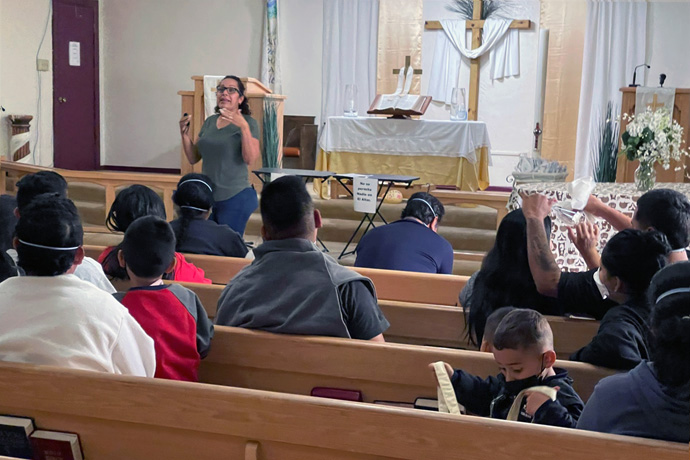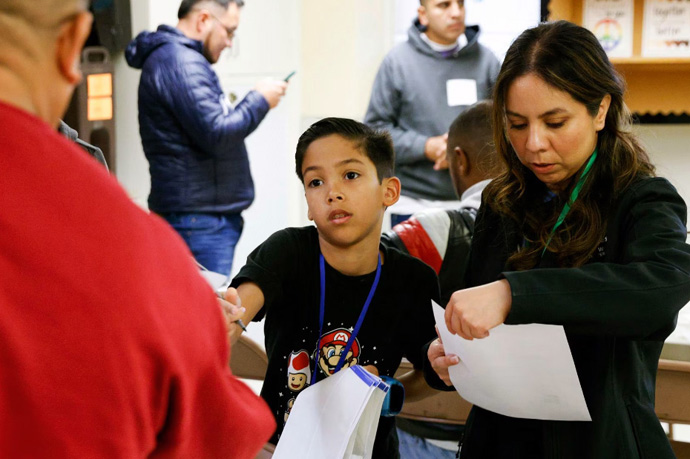Key points
- Many predicted a surge of asylum-seekers crossing into the U.S. from Mexico after the end of the COVID-related immigration restriction called Title 42.
- So far that spike hasn’t happened.
- United Methodists remain busy supporting what was already a large number of asylum-seekers.
With last week’s big change in U.S. immigration policy, many politicians and others predicted a tidal wave of asylum-seekers coming across the southern border.
That’s not been the case so far. But United Methodists who assist migrants remain busy — and concerned.
“What I tell churches is: ‘Prepare for the unknown,’” said Billie Fidlin, director of outreach and justice for the Desert Southwest Conference and board president of the Arizona Faith Network. “Maybe the time for the surge has just not happened yet.”
At El Calvario United Methodist Church, in the border city of Las Cruces, New Mexico, the past few days haven’t brought a rush of migrants needing food, shelter, clothing, medical care and other help before moving on to connect with family members or other sponsors in the U.S.
But, as the Rev. George Miller points out, traffic for the church’s ministry was steadily building long before the expected surge.
“The numbers have doubled since last year. Maybe even more than that,” said Miller, pastor of El Calvario.

Title 42 is the restrictive immigration policy that ended on May 11. Strictly speaking, Title 42 is part of federal public health law, but the term has become shorthand for a specific rule that allows the head of the Centers for Disease Control and Prevention to block entry of noncitizens in a health emergency.
Invoked by the Trump administration early in the pandemic, Title 42 allowed for rapid expulsion of asylum-seekers on the grounds that they could spread the coronavirus.
Title 42 has had many critics, including Church World Service, a United Methodist-supported nonprofit whose work includes refugee resettlement.
Church World Service issued a May 10 statement calling Title 42 “unique in its cruelty” to asylum seekers, many of them fleeing violence, poverty and corruption in their home countries.
But Church World Service and others also take issue with Biden administration policies replacing Title 42, including one requiring many migrants to prove they have been denied asylum in another country before applying in the U.S.
“It feels like there’s a war on asylum,” said Alba Jaramillo, co-executive director of Immigration Law & Justice Network, a United Methodist-affiliated legal assistance nonprofit formerly known as National Justice for Our Neighbors. “Instead of facilitating people to access the asylum system, we’re creating more barriers.”
Few if any issues are more politically polarizing than immigration. Still, there seemed to be a wide consensus that the lifting of Title 42 would, at least in the near term, exacerbate an unstable situation at the U.S.-Mexico border, prompting many more people to try to get across.
The United Methodist Church’s California-Pacific Conference made an urgent call for donations to shelters at or near the border, given the anticipated influx.
Cal-Pac Bishop Dottie Escobedo-Frank shared her concern about a dangerous situation last week in Jacumba Hot Springs, California, where a large group of migrants waited in remote, high desert conditions to be processed by Border Patrol agents.
Subscribe to our
e-newsletter
But, as local news organizations reported, agents finally did transport them for eventual processing.
Meanwhile, Secretary of Homeland Security Alejandro Mayorkas reported an actual decline in border encounters since May 11 and credited the Biden administration’s new policies, as well as its planning for the expiration of Title 42.
Court challenges to the administration’s approach are ongoing, but for now, those in a position to know are verifying that the surge hasn’t materialized.
“Everyone was gearing up for the storm event. We haven’t really seen it,” said Michael Smith, executive director of the United Methodist-related Holding Institute Community Center in Laredo, Texas, during a May 16 online meeting of the Rio Texas Conference-supported Texas Border Collaboration Network.
Meanwhile, United Methodists involved in supporting migrants have been working hard of late, and the Title 42 transition has helped bring that to light.
KERA, a Dallas public radio station, featured Oak Lawn United Methodist Church in a report tied to the policy change.
The church in Dallas’ Uptown neighborhood has lately been an even busier hub for interfaith work on behalf of migrants, weekly accepting buses of people just released from detention centers. They get a range of support at the church before moving on to connect with family members or other sponsors.
The number of buses has picked up, and that’s fine with Oak Lawn United Methodist.
“We’re very happy to be a space of welcome and hospitality,” said the Rev. Rachel Griffin, senior pastor.
The Dallas Morning News recently featured 9-year-old Asher Vargas, who has sorted donated clothes at Oak Lawn United Methodist and helped with client intake. He even traveled to Austin to speak to a Texas legislative committee, arguing against a proposed state border protection unit.
“He’s been such an incredible inspiration,” said Oak Lawn’s associate pastor, Isabel Marquez.

Much farther from the southern border, St. Paul and St. Andrew United Methodist Church has for the past six months responded in a big way to the need created by buses of migrants arriving in New York City.
Each Monday morning, with help from a range of partner organizations, the Manhattan church offers food, hygiene items, spiritual counseling, legal help and other services.
“They have come to be known here as Miracle Mondays,” said the Rev. Lea Matthews, associate pastor. “That is our day to welcome our newly arriving neighbors and to help resource them in myriad ways. Our support has expanded just based on need.”
No post-Title 42 surge has been seen so far at Christ Ministry Center, a United Methodist urban ministry hub in San Diego. But the steady work of sheltering and in other ways supporting migrants continues, said the Rev. Donald Owens, executive director.
He and his staff have assisted migrants from 29 countries.
“They’re fleeing from disasters. They’re fleeing from violence. It’s the Christian response to help them as much as we can,” Owens said.
The United Methodist Church references various Old Testament and New Testament verses in its official call for welcoming and supporting migrants, and for comprehensive reform of the U.S. immigration system.
Those working daily through United Methodist channels to support asylum-seekers keep coming back to the basics.
“I believe it is our human rights obligation to at least provide an opportunity for people to request safety,” Jaramillo said.
Hodges is a Dallas-based writer for United Methodist News. Contact him at 615-742-5470 or newsdesk@umcom.org. To read more United Methodist news, subscribe to the free Daily or Weekly Digests.




